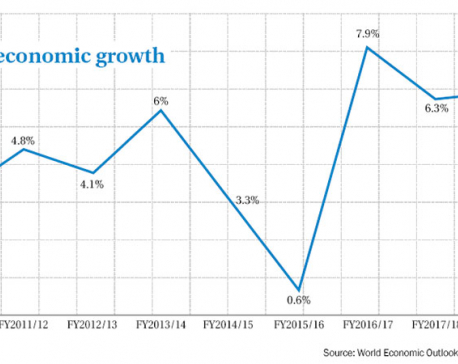
OR
IMF keeps Nepal’s growth projection unchanged at 5%
Published On: October 10, 2018 09:58 AM NPT By: Republica | @RepublicaNepal

We may revise growth projection after Article IV consultation: IMF’s Almekinders
KATHMANDU, Oct 10: The International Monetary Fund (IMF) has kept economic growth projection for Nepal for the current Fiscal Year 2018/19 unchanged at 5 percent.
Earlier in April also, IMF had project 5 percent growth rate for FY2018/19.
Releasing World Economic Outlook -- a survey conducted and published by the IMF twice a year -- on the sidelines of 2018 Annual Meetings of the IMF and the World Bank, in Bali of Indonesia on Tuesday, IMF said that the growth is expected to expand at 5 percent in the current fiscal year.
The growth projection is far below the government’s target to achieve 8 percent economic growth.
Earlier last month, the Asian Development Bank (ADB) lowered the growth forecast for the current fiscal year to 5.5 percent, while the World Bank on Sunday said that the economy is set to grow by 5.9 percent.
“Our projection for growth has remained unchanged from the Spring, 2018,” said Gerard J Almekinders, the IMF’s mission chief to Nepal, in an emailed statement, referring to the World Economic Outlook released in April.
“We may revise the growth projections for Nepal upward in the context of the mission for the Article IV consultation which starts in late-November/early-December,” he said.
The IMF is scheduled to send its mission to Nepal at the end of this year for assessment of the country’s economic and financial developments as part of its surveillance of the economy which is commonly known as the Article IV Consultation.
According to IMF’s Almekinders, reduced political uncertainty and markedly improved power supply, for instances, could form the basis for an acceleration of structural reforms and sustained pickup in investment which could boost medium-term growth.
“Much will depend on progress in reforms, particularly with regard to strengthening key institutions and administrative capacity, including at the state and local levels to which substantial spending responsibilities have been devolved under the new framework for federal fiscal relations, and improving the business climate to boost private investment,” Almekinders said in the statement.
You May Like This

IMF forecasts 6.5 percent growth for Nepal
KATHMANDU, April 10: The latest edition of the World Economic Outlook (WEO) from the International Monetary Fund (IMF) has projected... Read More...

IMF forecasts Nepal's economic growth rate at 4.2 percent
KATHMANDU, Oct 24: The International Monetary Fund (IMF) has released a new projection of Nepal's economic growth rate of 4.2... Read More...

IMF cuts China's 2019 economic growth forecast to 6.2% from 6.3%
BEIJING, June 5: The International Monetary Fund (IMF) on Wednesday cut its 2019 economic growth forecast for China to 6.2% on... Read More...



Just In
- World Malaria Day: Foreign returnees more susceptible to the vector-borne disease
- MoEST seeks EC’s help in identifying teachers linked to political parties
- 70 community and national forests affected by fire in Parbat till Wednesday
- NEPSE loses 3.24 points, while daily turnover inclines to Rs 2.36 billion
- Pak Embassy awards scholarships to 180 Nepali students
- President Paudel approves mobilization of army personnel for by-elections security
- Bhajang and Ilam by-elections: 69 polling stations classified as ‘highly sensitive’
- Karnali CM Kandel secures vote of confidence
















Leave A Comment